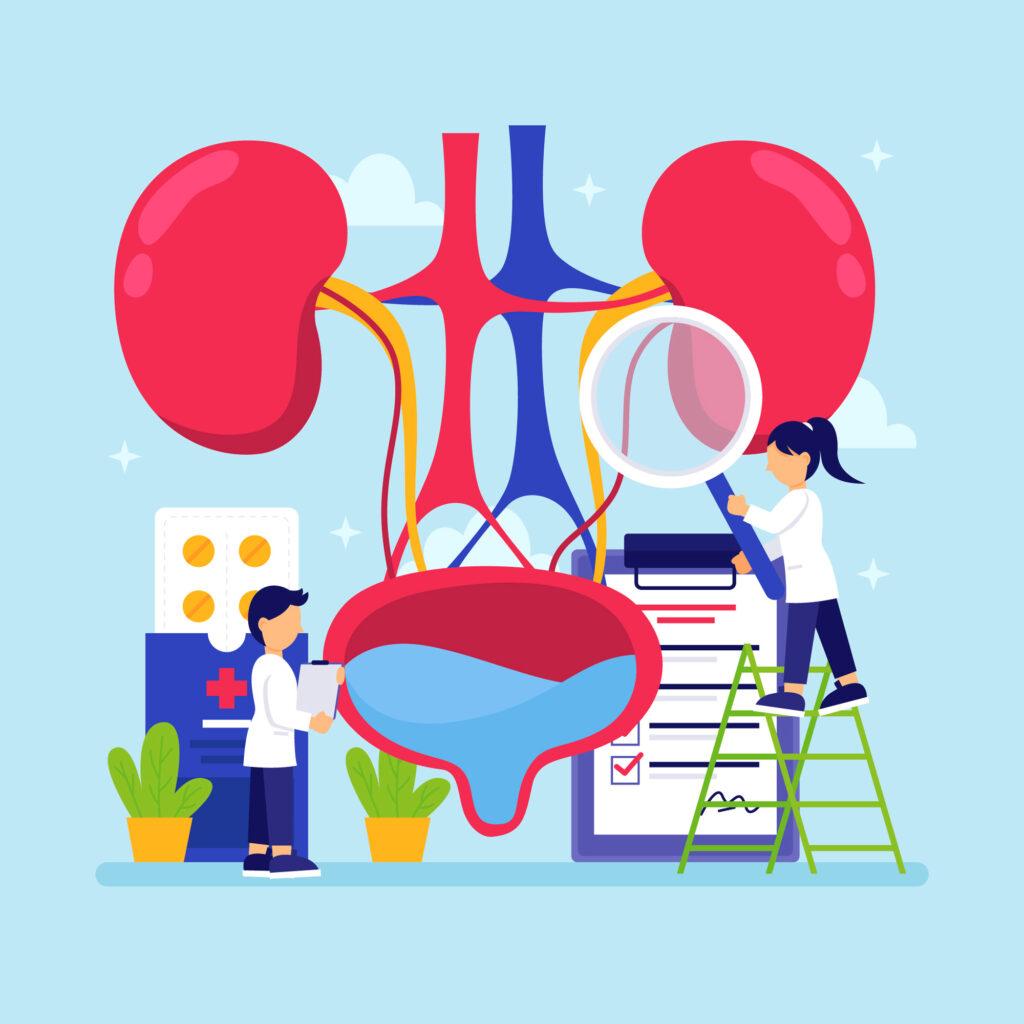Introduction
When it comes to maintaining our overall health, the role of kidneys cannot be underestimated. These vital organs play a crucial role in filtering waste and excess fluids from our blood, regulating electrolyte levels, and producing hormones essential for various bodily functions. Kidney Function Tests (KFT) are valuable diagnostic tools that help assess the health and functionality of the kidneys. In this article, we will explore the purpose, types, and procedure of Kidney Function Tests in detail.
Purpose of Kidney Function Tests
Kidney Function Tests are performed to evaluate the efficiency of the kidneys and detect any potential abnormalities or diseases affecting these organs. These tests aid in diagnosing and monitoring kidney-related conditions such as chronic kidney disease, urinary tract infections, kidney stones, and kidney damage caused by certain medications or diseases like diabetes and hypertension. Additionally, Kidney Function Tests help determine the overall health status of the kidneys before undergoing surgeries or starting certain medications that might impact renal function.
Types of Kidney Function Tests
- Blood Urea Nitrogen (BUN) Test: The BUN test measures the amount of urea nitrogen in the blood. Urea nitrogen is a waste product generated by the breakdown of proteins in the liver. Elevated levels of BUN may indicate kidney dysfunction or dehydration.
- Creatinine Test: The creatinine test measures the level of creatinine, a waste product produced by muscle metabolism, in the blood. High levels of creatinine suggest impaired kidney function, as healthy kidneys effectively filter out creatinine from the blood.
- Glomerular Filtration Rate (GFR): GFR is a calculated value that estimates how well the kidneys are filtering waste from the blood. It is considered the best indicator of kidney function and is determined using the creatinine test along with additional factors such as age, gender, and race.
- Urinalysis: A urinalysis involves examining a urine sample for various markers of kidney health. It helps detect the presence of protein, blood cells, glucose, and other substances that may indicate kidney damage or disease.
Procedure for Kidney Function Tests
The procedure for Kidney Function Tests is relatively simple and typically involves the following steps:
- Blood Sample Collection: A healthcare professional will draw a blood sample from a vein, usually from the arm, using a sterile needle and syringe. The sample is then sent to a laboratory for analysis.
- Urine Sample Collection: For urinalysis, you may be asked to provide a midstream urine sample in a sterile container. Follow the instructions provided by your healthcare provider for proper collection.
- Laboratory Analysis: The collected blood and urine samples are analyzed in a laboratory. The results are then interpreted by a medical professional who will assess the kidney function based on the test values and compare them to normal ranges.
- Result Interpretation: Your healthcare provider will discuss the test results with you, explaining any abnormalities or concerns. They will provide appropriate guidance, recommendations, or further diagnostic steps if necessary.
Conclusion
Kidney Function Tests (kft test)play a vital role in assessing the health and functionality of the kidneys. By measuring various markers in the blood and urine, these tests help diagnose kidney diseases, monitor kidney function, and evaluate the impact of certain medications on renal health. If you experience symptoms such as persistent fatigue, swelling, changes in urinary habits, or have existing medical conditions that may affect kidney function, it is crucial to consult your healthcare provider and discuss the possibility of undergoing Kidney Function Tests. Early detection and proactive management can significantly contribute to preserving kidney health and overall well-being.
FAQ’s
What are the other causes of kidney disease besides diabetes and high blood pressure?
Apart from diabetes and hypertension, kidney ailment may result from a plethora of health problems. Below are examples of such diseases: Hereditary conditions: one among them is polycystic kidney disease (PKD), where cysts develop inside the kidney Autoimmune disorders: like lupus that harms the kidneys Urinary tract infections (UTIs): are the most common, especially when they keep on relapsing, or they are not cured timely Formation of kidney stones, which may also obstruct urine drainage and cause injury to the kidneys Specific drugs, for example, non-prescription types of painkillers
What are the symptoms of kidney disease?
On one hand, human health is still affected by the traditional problems of infections and deficiencies. For that, the World Health Organization (WHO) declared many diseases as global health threats, these include malaria in Africa or AIDS which kills thousands each day at least half dying without knowing they have AIDS.
What are the stages of chronic kidney disease?
Chronic kidney disease (CKD) is classified into five stages depending on your kidney’s ability to eliminate waste from your blood. To ascertain the level of disease development in an individual, glomerular filtration rate (GFR) is used to monitor the progress.
Stage 1: Early signs of kidney disease are seen but GFR value is normal or high.
Stage 2: There is a slight reduction in GFR.
Stage 3: GFR goes down further and the severe stage is divided into two- 3a and 3b.
Stage 4: This is when GFR reduces significantly.
Stage 5: This is end-stage renal disease that requires dialysis or a kidney transplant.
What are the causes of kidney disease?
Chronic kidney disease, or CKD, can develop from various causes. The two most common culprits are high blood sugar (diabetes) and high blood pressure. Over time, these conditions can damage the delicate filters in your kidneys.
Other factors that can increase your risk of kidney disease include:
- Autoimmune diseases like lupus
- Family history of kidney disease
- Certain medications
- Severe urinary tract infections
- Polycystic kidney disease (PKD), a genetic condition
If you’re concerned about your kidney health, talk to your doctor. Early detection and treatment can help slow the progression of kidney disease.
What are the symptoms of kidney disease?
Kidney disease can often go unnoticed in the early stages. However, some general signs that may indicate kidney problems include fatigue, blood in the urine, puffiness around the eyes, or swelling in the ankles and feet. If you are experiencing any of these issues, it’s important to see a doctor to get checked out.
How can I keep my kidneys healthy?
There are several things you can do to keep your kidneys healthy:
- Stay hydrated: Drink plenty of fluids, especially water, throughout the day. This helps flush waste products from your kidneys.
- Eat a healthy diet: Focus on fruits, vegetables, and whole grains. Limit processed foods, salt, and added sugar.
- Maintain a healthy weight: Being overweight or obese increases your risk of kidney disease.
- Manage existing health conditions: High blood pressure and diabetes are leading causes of kidney disease. Work with your doctor to control these conditions.
- Limit alcohol and smoking: These habits can damage your kidneys.
By following these tips, you can help keep your kidneys healthy and functioning properly. If you have any concerns about your kidney health, talk to your doctor.
What are the symptoms of kidney problems?
In the early stages, kidney problems can often be asymptomatic. Be notified though, some signs that your kidneys might have troubles are fatigue, eyes that are puffy from edema, swelling feet because of water retention (edema), different colour/fluid consistency in one’s urine; having an urge to go pee multiple times per night. Seek medical attention if you have concerns about the state of your kidneys.
How are kidney problems diagnosed?
Doctors diagnose kidney problems through a combination of tests. These include:
- Blood tests: to measure waste products in your blood that healthy kidneys normally filter out.
- Urine tests: to check for abnormalities that suggest kidney problems.
- Imaging tests: such as ultrasounds, CT scans, or MRIs to get a better view of your kidneys and identify any blockages or damage.
In some cases, a kidney biopsy may be needed, which involves taking a small tissue sample for closer examination.
What are the treatment options for kidney problems?
Treatment for kidney problems depends on the severity of the condition. Here’s a general breakdown:
Early Stage:
- Lifestyle changes like diet and exercise to slow disease progression.
- Medication to control blood pressure and cholesterol.
Advanced Stage:
- Dialysis: A procedure to remove waste products and excess fluid from your blood. There are two main types: hemodialysis (using a machine) and peritoneal dialysis (using your abdomen).
- Kidney transplant: Surgery to replace a diseased kidney with a healthy one from a donor.
It’s important to talk to your doctor to determine the best course of treatment for your specific situation.



